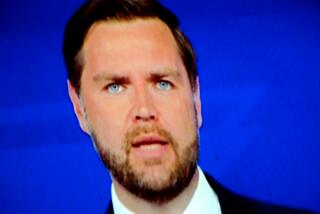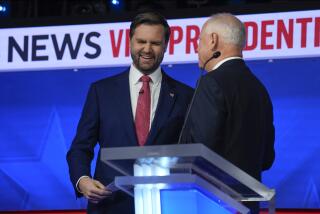POLITICS 88 : Geography, Philosophy Are Factors : Names Floated, Hints Dropped on Bush VP
- Share via
WASHINGTON — Even before Vice President George Bush ventured in to accept the accolades for last week’s rout in frigid Illinois, signs sprouted at his victory party like defiant spring crocuses: “Bush-Thompson ’88.”
Another state, another vice presidential candidate. In Illinois it was James R. Thompson, the hulking governor. In South Carolina 10 days earlier, it was Carroll A. Campbell Jr., the blow-dried chief executive. In California this June, expect Gov. George Deukmejian to get some nods.
With the Republican presidential nomination all but locked up, the only excitement left for political junkies here revolves around the ticket’s second spot. Who would be George Bush’s George Bush?
Ordered No Discussion
The man who will decide it professes not to know--and not to care, at this point--and has ordered his aides not to foment discussion.
“I know you won’t believe this--it’s the whole truth, nothing but the truth--there isn’t a list,” Bush pleaded the other day when a Rockford, Ill., reporter asked the inevitable.
“I literally haven’t been in the position of dangling the vice presidency, the secretary of H-H-whatever-it-is (and other Cabinet posts) in front of anybody. I just haven’t done that. It’s good because you don’t have to remember when you lied last.”
Bush may be putting an innocent face on it, but among staff members, fellow Republicans and analysts of all philosophical stripes, the matter has taken on an interest accelerated by the absence of anything else to debate.
No one professes to know who exactly is on Bush’s mind. But names are being floated, candidates are dropping hints, pressures are beginning to build, and amid the hubbub, Bush strategists are trying to prevent the selection process from boomeranging back at him. Some worry that a lengthy pull-and-tug, as it almost assuredly will be, could make Bush look either indecisive, cautious or compliant to the demands of specific groups within the party.
‘Got to Pick This Guy’
“It’s a matter of pressure,” said Peter Teeley, Bush’s campaign spokesman. “Let’s face it, everybody and their brother is going to be calling--hey, you’ve got to pick this guy to carry the South or that guy to carry New England.”
The cross-hairs through which the vice presidential nominee will be sighted are geography and political philosophy, although there remains substantial discord about which of those will predominate and how any one candidate could manage to satisfy all parties.
Bush is particularly keen on making the process harmonious because of the tortured path he took to the vice presidency: Only after Reagan aides tried mightily and unsuccessfully to convince former President Gerald R. Ford to join the ticket was Bush picked. And then he came under blistering attack from conservatives who felt slighted by his more moderate stances.
Bush himself is fond of saying that in this age of quicksilver satellite communications, geography is not the overriding consideration it once was, when candidates from one quadrant of the country felt compelled to balance themselves with a partner from another.
Nevertheless, several analysts see Bush, who claims Texas as his primary home state but seems in spirit a Yankee blueblood, as needing to share the ticket with someone from the Midwest, South or West who could deliver delegates in big states.
Deukmejian Candidacy Cited
The most talked-about candidate in the West is Deukmejian, who is given high marks for being “stable” by some Bush advisers and whose conservative credentials could firm up right-wing votes for Bush.
But Deukmejian would not lend fire to a ticket already accused of being dull, as Bush essentially acknowledged at a fund-raiser that he and the California governor attended in Boston last fall.
“I give you a lot of credit for having George Deukmejian and me here,” Bush told the audience. “Most audiences wouldn’t be able to stand this much charisma all at once.”
Deukmejian’s departure also would pose a thorny political problem--turning over the state to Democratic Lt. Gov. Leo McCarthy.
“George should be on the list, but I don’t think that’s realistic,” said California-based consultant Stuart Spencer.
Impact of Departure
Deukmejian himself, as recently as Monday, refused to consider the job because of the impact of his departure.
Some also suggest that Bush may not need Deukmejian to collect California’s delegates, and that he should thus look elsewhere.
“You don’t ever go after something you have,” said Claibourne Darden, an Atlanta-based Republican consultant.
“Any viable Democrat takes the Northeast and the industrialized Midwest. . . . Any viable Republican candidate takes the West Coast and into the center of the country. The swing vote is the South.”
Among Southerners, the name most frequently floated is former Tennessee Gov. Lamar Alexander, now the president of the University of Tennessee.
‘Education President’
Bush, who mentions at nearly every stop that he wants “to be the education President,” frequently cites Alexander as a model for what Bush himself wants to do at the national level--illuminate the work of good teachers and elevate education. Alexander’s major achievement in eight years as governor--which ended in 1986--was his “Better Schools” program, a $1.2-billion package of incentives for teachers.
“You got the impression of him being for the average people, not for the country club Republicans,” said Darden, by inference raising one of Bush’s liabilities. But, he added: “The average person would say ‘Alexander who?’ Alexander the Great has a higher name recognition than Gov. Alexander.”
Alexander, who is being pushed by some Southern and Border state Republicans, was asked about his aspirations in January, when the university’s Board of Trustees inquired whether he might leave to become the vice presidential nominee.
“I don’t expect to be asked and if I’m asked I don’t expect to say no,” he answered.
But others argue that Alexander has less potential than Campbell, the governor of South Carolina who endorsed Bush and whose popularity helped Bush win a crucial primary there.
Low in Voter Identification
Campbell is a telegenic, first-term governor and former congressman who has shown an ability to build the party in South Carolina, although he, like Alexander, is low in the area of voter identification.
Geography may doom some potential running mates. Former Gov. Richard Thornburgh of Pennsylvania is commonly mentioned as a strong Republican in the Northeast, but Pennsylvania’s proximity to Bush’s native New England weighs against him. That criticism also would seem to knock New Jersey Gov. Thomas H. Kean out of the running.
Besides geography, Bush must decide what philosophical branch of the party he most needs to please. Arguments exist in Bush’s own staff as to whether a conservative or a moderate would best serve the ticket, and others suggest that problem reflects Bush’s shakiness among some sectors of the party.
According to one school of thought, Bush needs the right wing in tow--so he should pick a conservative. The countermanding argument is that Democrats and independents will cast the deciding votes in 1988 and Bush must pick a moderate who would appeal to them.
“Bush has the conservative vote in his pocket,” said Atlanta’s Darden. “He should choose someone more moderate--move over and crowd the Democrats a little bit.”
Might Sit Out Election
Others disagree, contending that while conservatives would surely prefer Bush over any Democrat, they might sit the election out if disaffected.
“There is a significant issue still there as to whether or not he could take a candidate perceived to be on the left,” said a Bush campaign official, who asked not to be identified in deference to the vice president’s wish that the matter not be discussed publicly.
“He has inherited the Reagan mantle but without the enthusiasm. There’s always the risk that you’d alienate (conservatives).”
Conservative New York Rep. Jack Kemp, who recently quit the race, has declared that the vice presidential nomination would be “an honor” and was thrown compliments by some Bush staff members.
But there are doubters. A high-ranking Bush strategist suggested that Kemp’s disappointing presidential bid proved him incapable of attracting enough conservatives to make him worthwhile.
Kemp Appeal Downplayed
“I’m not sure the case can be made that Jack Kemp brings a lot to the ticket,” added Washington-based consultant Eddie Mahe Jr. “I’m not sure the case can be made that he brings New York.”
Bush could make a splash, those inside and outside his campaigns agree, if he named a woman to the Republican ticket. It would amount to an almost brazen act, given Bush’s typical caution.
Among those most frequently mentioned on the women’s list--rarely are the lists integrated--are former Transportation Secretary Elizabeth Hanford Dole, the wife and chief campaigner for Bush’s primary competitor for the nomination, Kansas Sen. Bob Dole; former U.N. Ambassador Jeane J. Kirkpatrick, also a Dole supporter, and Kansas Sen. Nancy Landon Kassebaum.
Elizabeth Dole and Kirkpatrick carry some liabilities--neither has served in elective office; Dole’s husband has fought against Bush in a bitter primary campaign, and Kirkpatrick’s outspoken manner could clash with Bush’s ideal of a subservient vice president.
Kassebaum is known as an effective campaigner and some observers believe her personality would mesh well with Bush’s.
Loath to Discuss Matter
The decision, however, is unlikely to be made any time soon. Bush is loath to discuss the matter until he formally earns enough delegates to clinch the nomination, lest he appear too confident.
Several Bush aides also suggested that he would delay a decision until after the Democratic convention in July, when that party’s strategy will be laid out and Republicans will be in a better position to devise their own battle plan.
“There may be someone who emerges that he feels so strongly about that it won’t matter, but I think it’d be prudent to wait and see what the Democrats get,” said Craig Fuller, Bush’s chief of staff.
Bush himself has described in general terms what he wants in a vice president.
“I don’t want anyone who agrees on absolutely crossing every T and I the same way I would, but I would want the person to feel comfortable enough so they wouldn’t be up (saying), ‘Look what this idiot’s doing.’ You can’t have that and have it amount to anything.”
More to Read
Get the L.A. Times Politics newsletter
Deeply reported insights into legislation, politics and policy from Sacramento, Washington and beyond. In your inbox twice per week.
You may occasionally receive promotional content from the Los Angeles Times.











